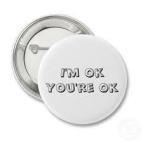 Reader Diane sent me an article by Emma Woolf ITW: everything I’m about to talk about] asking why, if fat bashing is not ok, thin bashing is?
Reader Diane sent me an article by Emma Woolf ITW: everything I’m about to talk about] asking why, if fat bashing is not ok, thin bashing is?
The article started:
I have never been fat, but I know exactly what it is like to be judged for my size and hear unkind comments about my appearance. We need to shift the weight debate to health, rather than looks
So far so good – I agree with this. I don’t care how much thin privilege someone has, I’m against body shaming for bodies of every size and I believe that a culture of stereotype photo shop beauty, body bashing, fat shaming, and the fear of fat hurt everyone.
I also think that having thin fat activists/allies is important and that it’s easier to create allies where there is common ground – if someone is acknowledging that the way fat people are treated is wrong and they realized this through some empathy from personal experience, then I think we’re moving in the right direction and I’m not likely to jump right into “ACKNOWLEDGE YOUR PRIVILEGE!” I’m happy to save those important discussions for later, once we have a bond that makes the discussion more likely to lead to empathy and understanding than defensiveness and frustration.
Unfortunately, Emma takes a bad turn. She says “my book contains not a single word of criticism about larger-sized people.” But then there’s this:
I’m fed up with being judged for being physically disciplined, for watching what I eat, and for exercising five times a week.
If Emma is being judged/bashed/shamed because she is thin, I think that’s wrong, but it’s not the same as being judged for her eating and exercise choices. Those are separate from body size and when you’re working with stereotypes like this and making assumptions and confusion behaviors with body size you can assume that you are traveling down a bad road. Things do not get better:
Other things a thin woman is not allowed to say: “it takes willpower to stay slim”; “of course it would be easier just to eat anything I wanted but I don’t”; “yes, I’m often hungry mid-morning but I wait until lunchtime”. Above all, a slim woman must never say: “I prefer being slim.”
Actually a thin woman can say all of those things but she doesn’t say them in a vacuum. First of all, there are many, many studies that show that body size is not a matter of willpower, or a matter of ignoring our bodies’ hunger signals. And it’s not surprising that one would prefer being slim considering it means not have war waged on you by the government for how you look – but that’s where it helps to understand that, even if a thin woman is wrongly shamed for having a thin body, there are still privileges that she receives that make her life different than the lives of fat people and it would be pretty cool if she would work to make sure that everyone has the opportunity to prefer being the size that they are like she does.
I wasted a decade struggling with the mental twists and turns of anorexia. It was only in the last few years, when I found a medical reason to recover – my fertility — that I made progress with weight gain. Could the same approach work for weight loss? If we reframed the debate around fat and accepted that it can be a form of disordered eating with physical consequences, we might start to get somewhere.
I am so sorry that Emma had to struggle with an eating disorder, but her attempt to extrapolate her experience to fat people, and her thinking around fat and eating disorders is deeply flawed. Body size is not an eating disorder diagnosis. Eating disorders are complicated mental illnesses with various physical symptoms, behaviors, and manifestations that can be different for everyone. People of all sizes have all kinds of eating disorders – there are fat anorexics and thin people with Binge Eating Disorder.
People who have recovered from eating disorders are also all different sizes. The conflation of size and diagnosis and the assumption of size and cure do a disservice to everyone. The problem with weight loss isn’t that it’s not tied to mental illness, the problem with weight loss is that is just doesn’t work. Almost everyone loses weight in the short term, almost everyone gains it back in the long term and attempting to diagnose an eating disorder based on body size won’t change that but will cause a host of additional problems.
The piece ended up in a very different place than it started when Emma was suggesting that “We need to shift the weight debate to health, rather than looks.” When you equate looks with health you make that shift impossible, and you add to the tremendous about of stigma, stereotyping and shame that fat people already face – and since you know how painful that is, if you think about it I think you’ll realize that you know better.
Like the blog? Here’s more of my stuff:
Interviews with Amazing Activists!! Help Activists tell our movement’s history in their own words. Support In Our Own Words: A Fat Activist History Project!
Become a member: For just ten bucks a month you can keep this blog ad-free, support the activism work I do, and get deals from cool businesses Click here for details
The Book: Fat: The Owner’s Manual The E-Book is Name Your Own Price! Click here for details
Dance Classes: Buy the Dance Class DVDs or download individual classes – Every Body Dance Now! Click here for details
